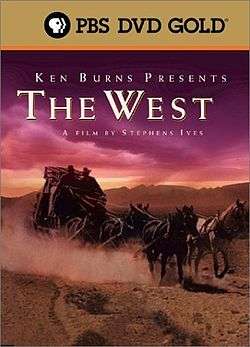The West (film)
| The West | |
|---|---|
 DVD cover for The West | |
| Also known as | 'Ken Burns Presents: The West' |
| Genre | Documentary film |
| Written by |
Dayton Duncan Geoffrey Ward |
| Directed by | Stephen Ives |
| Voices of |
Adam Arkin Matthew Broderick Keith Carradine John Lithgow Gary Sinise Jimmy Smits |
| Narrated by | Peter Coyote |
| Country of origin | United States |
| Original language(s) | English |
| No. of seasons | 1 |
| No. of episodes | 8 |
| Production | |
| Executive producer(s) | Ken Burns |
| Producer(s) |
Stephen Ives Jody Abramson Michael Kantor |
| Running time | 12 hours (8 episodes) |
| Production company(s) |
Insignia Films Florentine Films WETA-TV |
| Release | |
| Original network | PBS |
| Original release | September 15 – September 22, 1996 |
| External links | |
| Website | |
The West, sometimes marketed as Ken Burns Presents: The West, is a 1996 documentary film about the American Old West. It was directed by Stephen Ives and featured Ken Burns as executive producer. The film was divided into eight episodes and originally aired on PBS in September 1996.
Production
Stephen Ives and Ken Burns had worked together on several previous films, including The Civil War (1990) and Baseball (1994).[1] In 1988, Ives created his own production company, Insignia Films, and began working on The West as director, with Burns signed on to the project as executive producer.[1] In order to create The West, the film crew traveled over 100,000 miles (160,000 km) via airplane, conducted 72 interviews, visited 74 archives and collections, and filmed more than 250 hours of footage.[2] The film's production was funded by General Motors.[3]
Notable interviewees included historians Stephen Ambrose, J. S. Holliday, and Richard White; novelists Maxine Hong Kingston and N. Scott Momaday; environmentalists and writers Terry Tempest Williams and Marc Reisner; and politicians Ben Nighthorse Campbell, Ann Richards, Stewart Udall, and Ralph Yarborough.[4]
Many notable actors lent their voices to The West, including Adam Arkin, Ossie Davis, Keith Carradine, John Lithgow, Mary Stuart Masterson, Blythe Danner, the famous playwright Arthur Miller, and Jimmy Smits. The film's narrator, Peter Coyote, later also narrated Burns' documentary film The National Parks (2009).
Original airing
The West premiered on September 15, 1996, on PBS. The film was split into episodes, with one episode being aired each night for eight consecutive nights. Episodes were cut to about 90 minutes each in length, for a total length of over 12 hours for the entire film. The final episode aired on September 22, 1996.[5]
Episodes
| No. | Episode | Original air date |
|---|---|---|
| 1 | "The People" (to 1806) | September 15, 1996 |
| ||
| 2 | "Empire Upon the Trails" (1806–1848) | September 16, 1996 |
| ||
| 3 | "Speck of the Future" (1848–1856) | September 17, 1996 |
| ||
| 4 | "Death Runs Riot" (1856–1868) | September 18, 1996 |
| ||
| 5 | "The Grandest Enterprise Under God" (1868–1874) | September 19, 1996 |
| ||
| 6 | "Fight No More Forever" (1874–1877) | September 20, 1996 |
| ||
| 7 | "The Geography of Hope" (1877–1887) | September 21, 1996 |
| ||
| 8 | "One Sky Above Us" (1887–1914) | September 22, 1996 |
| ||
Home video release
When The West was released on VHS, the finale episode, "One Sky Above Us," was divided into two one-hour episodes, titled "Ghost Dance" and "One Sky Above Us." This VHS edition was released September 24, 1996. PBS later released a five-disc DVD set of The West on September 30, 2003.[6]
Reception
The West was well-received by both popular audiences and historians. Over 38 million viewers watched the film during its original airing,[1] and it earned an average national Nielsen rating of 5.0.[7] In 1997, the Organization of American Historians awarded The West its Erik Barnouw Award.[8]
Film and television critics also responded positively to The West. Caryn James of The New York Times praised the film for its "enthralling detail" and authenticity, calling it "fiercely and brilliantly rooted in fact."[9] Richard Zoglin of TIME judged the film "a sweeping, thoughtful, often moving look at America's conquest of the West",[10] and Howard Rosenberg of the Los Angeles Times wrote that, "director Stephen Ives succeeds magnificently, delivering a lush work at once fully documented and fully entertaining... no one could ask for better television."[11]
References
- 1 2 3 "Stephen Ives". Insignia Films. Retrieved 2009-08-09.
- ↑ "New Perspectives on THE WEST". The West. WETA-TV. 2001. Retrieved 2009-08-09.
- ↑ "A Message From the Sponsor". PBS. 2001.
- ↑ "Commentators and Consultants". The West. WETA-TV. 2001. Retrieved 2009-08-10.
- ↑ "Episodes". The West. WETA-TV. 2001. Retrieved 2009-08-09.
- ↑ "Ken Burns' America: The West". VideoETA. Retrieved 2009-08-09.
- ↑ Rankin, Charles E. (Autumn 1997). "'Not Such a Pretty Picture': Complexity and Understanding in 'The West'". The Western Historical Quarterly. 28 (3): 298–304. doi:10.2307/971020. JSTOR 971020.
- ↑ "OAH Erik Barnouw Award Winners". Organization of American Historians. Archived from the original on June 3, 2009. Retrieved 2009-08-09.
- ↑ James, Caryn (1996-09-15). "How The West Was Lost (As a Staple Of TV)". The New York Times. Retrieved 2009-08-09.
- ↑ Zoglin, Richard (1996-09-16). "White men behaving badly". TIME. 148 (13). p. 76.
- ↑ Rosenberg, Howard (1996-09-13). "'The West' Is Stunning History of a Magnificent, Bloody Land". Los Angeles Times. Retrieved 2009-08-09.
Further reading
- Ward, Geoffrey C. (2003). The West: An Illustrated History. Back Bay Books. ISBN 0-316-73589-2.
External links
| Wikiquote has quotations related to: The West (film) |